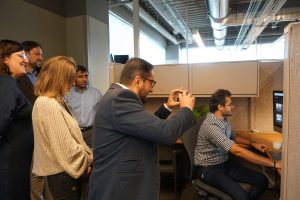On Monday, September 23, participants of the Department of State’s International Visitor Leadership Program made a stop at UA Little Rock. Individuals from seven different countries spent the morning speaking with members of the COSMOS team to learn about the broad range of research taking place, particularly regarding social cyber security and misinformation on social media. The countries represented include Bulgaria, Czech Republic, Estonia, Georgia, Montenegro, Romania, and Tajikistan.
Delegates learned about tools COSMOS Cosmographers have developed in order to study disinformation on social media platforms.
Blogtrackers is a tool designed by Dr. Nitin Agarwal in 2009 to to track and analyze blogs and gain insights from the blogosphere is. Through Blogtrackers, COSMOS has been actively studying information distributiondissemination and misinformation operations surrounding various events including NATO exercises, the migrant crisis in Europe, and the Venezuelan socio-economic crisis. Blogtrackers explores what and how much information is being spread, who is spreading it, how influential it is, and what the sentiment is behind the information.

YouTubeTrackers is a recently-developed tool that can analyze data in much the same way as Blogtrackers, as it tracks, monitors, and identifies influential YouTube groups and content. The tool aims to answer the same questions regarding content dissemination, level of influence, as well as frequency of posting.
The International Visitor Leadership Program (IVLP) began in 1940 in order to help “strengthen U.S. engagement with countries around the world and cultivate lasting relationships by connecting current and emerging foreign leaders with their American counterparts through short-term visits to the United States.” The program entitled ’21st Century ChangeMakers: Information Technology Leaders Explore Cyber Security Strategies’ is arranged by Family Health International, FHI 360 Global Connection, and supported through the local host organization Global Ties Arkansas.
This research at COSMOS is funded in part by the U.S. National Science Foundation, U.S. Office of Naval Research, U.S. Air Force Research Lab, U.S. Army Research Office, U.S. Defense Advanced Research Projects Agency, Arkansas Research Alliance, and the Jerry L. Maulden/Entergy Endowment at the University of Arkansas at Little Rock. Any opinions, findings, and conclusions or recommendations expressed in this material are those of the authors and do not necessarily reflect the views of the funding organizations.
